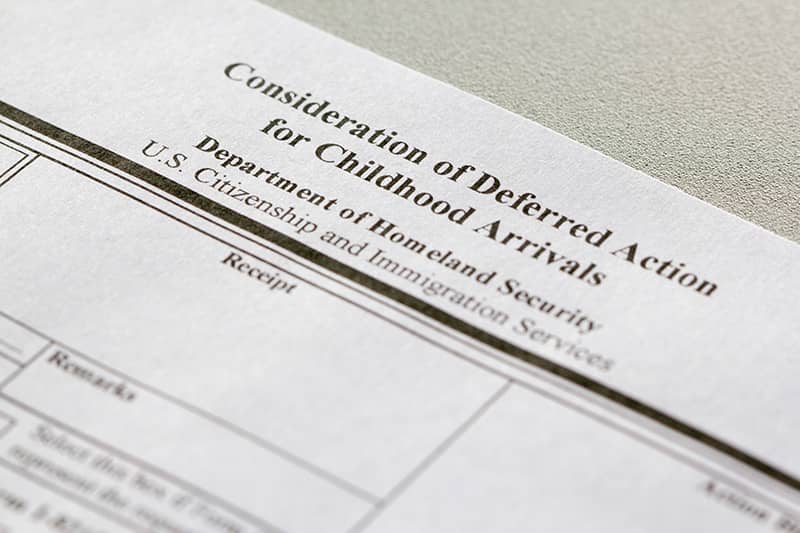Can DACA Recipients Apply for a Green Card?

The Deferred Action for Childhood Arrivals (DACA) program has provided temporary relief from deportation and work authorization to hundreds of thousands of young people who were brought to the U.S. as children.
While DACA has been a lifeline for many, it does not directly provide a path to permanent residency (a green card). However, DACA recipients may be eligible for a green card through other means. In this article, we’ll explore the ways DACA holders can potentially gain permanent status and the requirements they must meet.
The Relationship Between DACA and Green Card Eligibility
It’s important to understand that DACA itself does not lead to a green card. DACA is a form of prosecutorial discretion that allows certain young people who meet education and background check requirements to stay in the U.S. temporarily and work legally. But it does not change their underlying immigration status.
DACA Status Does Not Provide a Direct Path to a Green Card
While DACA provides important protections, it is not a direct route to permanent residency. DACA recipients must qualify for a green card through other channels, such as family or employment sponsorship, just like any other foreign national. Having DACA does not give you any special access to a green card.
DACA Recipients Must Meet All Green Card Eligibility Requirements
Moreover, having DACA does not waive or change any of the normal requirements for getting a green card. DACA holders must still meet all the eligibility criteria for the specific category they are applying under, which may include things like having a qualifying family relationship, a job offer at the required skill level, or demonstrating exceptional ability.
Most importantly, most green card categories require the applicant to have entered the U.S. legally – a requirement many DACA recipients may not meet, as we’ll discuss later.
Family-Based Green Cards for DACA Recipients
One of the most common ways for DACA recipients to gain a green card is through family sponsorship. If you have a close U.S. citizen relative, they may be able to petition for you to get permanent residency.
Immediate Relative Petitions
The fastest path is if you have a U.S. citizen spouse, unmarried child over 21, or parent (if you are unmarried and under 21). These “immediate relatives” can sponsor you for a green card right away – there are no waiting periods or numerical limits each year.
However, you still must have entered the U.S. legally to adjust status to a green card from within the U.S., unless you qualify for a special exception under INA 245(i) (more on that later).
Preference Category Family Petitions
If you have a more distant U.S. citizen relative (like a sibling or married child) or a green card holder relative, you may still be eligible for a family-based green card. But these “preference categories” have annual caps on the number of green cards issued, and the wait times can stretch for years, depending on the category and your country of origin. Again, the legal entry requirement applies unless you qualify for an exception.
Employment-Based Green Cards for DACA Recipients
Another potential path to a green card for DACA holders is through an employer sponsor. If you have advanced skills or exceptional abilities, a U.S. employer may be able to petition for you to get a green card.
Employer Sponsorship
Most employment-based green card categories require a job offer from a U.S. employer at a high skill level (typically requiring at least a bachelor’s degree). The employer generally must complete a labor certification process to show that there are no qualified U.S. workers available for the role.
Employer sponsorship can be a good option for DACA recipients who have completed higher education and work in specialized fields. But it’s important to understand that the process is costly and time-consuming for employers, and your DACA work permit is temporary, which can make employers reluctant to sponsor you.
National Interest Waiver
Some DACA recipients with truly exceptional skills or who are doing work that greatly benefits the U.S. may be able to self-petition for a green card without an employer sponsor. This is called a “national interest waiver.” But the standard is very high – you must show that your work is of such importance that it is in the national interest to waive the normal labor certification requirement.
While this is a challenging category, it may be an option for some DACA recipients who are engaged in cutting-edge research, entrepreneurship, or other work with significant societal impact.
Humanitarian Green Cards for DACA Recipients
In some cases, DACA recipients who have faced or fear persecution or who have been victims of abuse, abandonment or neglect by a parent may have a path to a green card through humanitarian programs.
Asylum Status
DACA recipients who fear returning to their country of origin due to past persecution or a well-founded fear of future persecution on account of their race, religion, nationality, political opinion, or membership in a particular social group may be eligible for asylum. Asylum leads to permanent residency and does not require legal entry. However, you must prove your case and apply within one year of entering the U.S. (with some exceptions).
Special Immigrant Juvenile Status
DACA recipients under 21 who have been abused, abandoned, or neglected by one or both parents may be eligible for Special Immigrant Juvenile Status (SIJS). To qualify, a state court must make certain findings about your situation and eligibility. SIJS provides a path to a green card without requiring legal entry. But you must apply before age 21, and the process involves both state court and USCIS adjudications.
The Advance Parole Option for DACA Recipients
One strategy that may open doors to a green card for some DACA recipients is Advance Parole. Advance Parole allows DACA holders to travel outside the U.S. for humanitarian, educational, or employment purposes and return lawfully.
How does this help with a green card? Well, if you are otherwise eligible for a green card (for example, through marriage to a U.S. citizen) but entered the U.S. without permission, you normally can’t adjust status to permanent residency from inside the U.S. But if you leave and re-enter on Advance Parole, that re-entry on parole will be considered a “lawful entry” for green card purposes.
Challenges and Considerations for DACA Green Card Applicants
Even if you are theoretically eligible for a green card, DACA recipients face some unique challenges in the application process.
Meeting the Legal Entry Requirement
As mentioned, most green card categories require that you entered the U.S. legally (on a valid visa). Many DACA recipients originally entered without inspection, and thus can’t meet this requirement, even if they are otherwise eligible (e.g., married to a U.S. citizen).
There is an exception in the law – INA 245(i) – that allows some people who entered without authorization but were the beneficiary of a qualifying petition filed before April 30, 2001, to pay a fine and still adjust status. Although many DACA recipients entered after this cutoff date, it’s important to check whether their parents were beneficiaries of any petitions from which they can also benefit
Bars to Adjustment of Status
Even if you have a legal entry or qualify for 245(i), certain issues in your background can make you ineligible to adjust status to a green card from within the U.S. These “bars” include things like criminal convictions, prior fraud or misrepresentation, and previous deportation orders. Waivers are available for some bars, but the standards are high.
Therefore, it’s absolutely essential to consult with an experienced immigration attorney before applying for any immigration benefit. An attorney can assess your individual situation, identify potential risks, and help you weigh your options.
What DACA Recipients Can Do to Explore Their Green Card Options
If you’re a DACA recipient interested in exploring your green card options, here are some steps you can take:
- Gather as much information as you can about your immigration history, family relationships, education, and any criminal record. This will help an attorney evaluate your eligibility.
- Schedule a consultation with a reputable immigration lawyer. Many firms offer free or low-cost initial consultations. The attorney can analyze your individual situation and advise you on potential paths forward.
- Talk to your family members. You may have U.S. citizen relatives who could petition for you but are unaware or reluctant. An attorney can help explain the process and address any concerns.
- Stay informed about any changes to DACA or relevant immigration laws. The more you understand about your own situation and the system overall, the better equipped you’ll be to make decisions about your future.
Gaining permanent residency is not an easy path for DACA recipients, but it’s not an impossible one either. While DACA itself doesn’t lead to a green card, you may have other options through family, employment, or humanitarian channels.
At the Law Office of Lina Baroudi, we understand the challenges DACA recipients face and are committed to providing compassionate, expert guidance. We can help you navigate this system and work towards your goals of stability and security.
You’ve already taken a brave step in pursuing DACA to build a life in the only country you know as home. Let us help you explore the next step towards a more permanent future. Contact us today for a consultation to discuss your unique situation and potential pathways forward.



